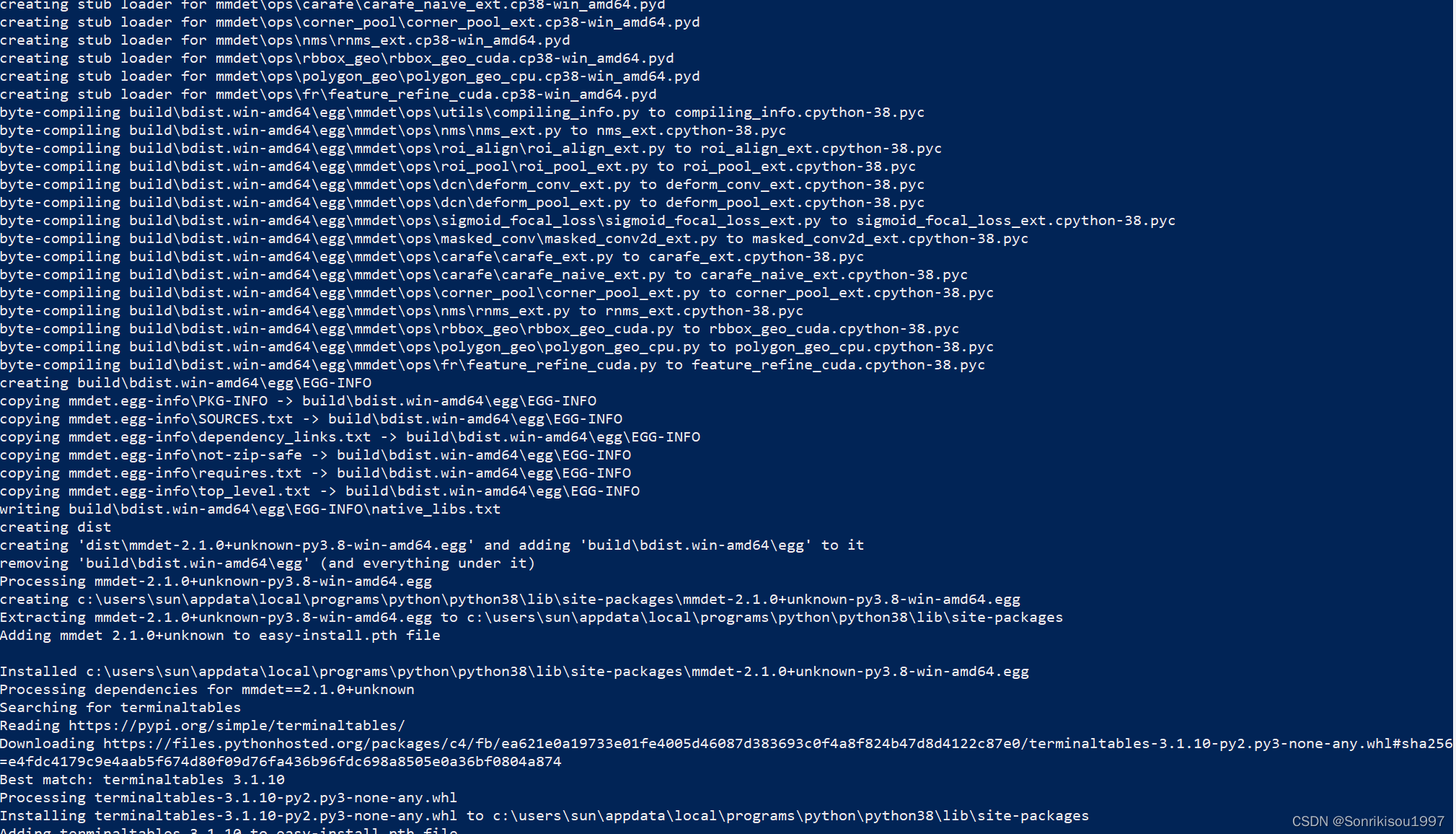错误内容:
sigmoid_focal_loss_cuda.obj : error LNK2001: 无法解析的外部符号 "public: long __cdecl at::Tensor::item<long>(void)const " (??$item@J@Tensor@at@@QEBAJXZ)
背景:
在Windows环境下安装mmdetection,进行cuda编译的时候出现,解决方法是首先按照如下的博客进行修改
(53条消息) 记录自己在mmdetection配置中遇到的坑_疯花正猫的博客-CSDN博客
若依旧出现错误之后将mmdet\ops\sigmoid_focal_loss\src\cuda\sigmoid_focal_loss_cuda.cu文件下的long修改为double
参考如下代码进行修改
// modified from
// https://github.com/facebookresearch/maskrcnn-benchmark/blob/master/maskrcnn_benchmark/csrc/cuda/SigmoidFocalLoss_cuda.cu
// Copyright (c) Facebook, Inc. and its affiliates. All Rights Reserved.
// This file is modified from
// https://github.com/pytorch/pytorch/blob/master/modules/detectron/sigmoid_focal_loss_op.cu
// Cheng-Yang Fu
// cyfu@cs.unc.edu
#include <ATen/ATen.h>
#include <ATen/cuda/CUDAContext.h>
#include <THC/THC.h>
#include <THC/THCAtomics.cuh>
#include <THC/THCDeviceUtils.cuh>
#include <cfloat>
int Ceil_div(int a, int b) { return (a + b - 1); }
// TODO make it in a common file
#define CUDA_1D_KERNEL_LOOP(i, n) \
for (int i = blockIdx.x * blockDim.x + threadIdx.x; i < n; \
i += blockDim.x * gridDim.x)
template <typename scalar_t>
//const int64_t *target-> const double *target
__global__ void SigmoidFocalLossForward(const int nthreads,
const scalar_t *logits,
const double *targets,
const int num_classes,
const float gamma, const float alpha,
const int num, scalar_t *losses) {
CUDA_1D_KERNEL_LOOP(i, nthreads) {
int n = i / num_classes;
int d = i % num_classes; // current class[0~79];
int t = targets[n]; // target class [0~79];
// Decide it is positive or negative case.
scalar_t c1 = (t == d);
scalar_t c2 = (t >= 0 & t != d);
scalar_t zn = (1.0 - alpha);
scalar_t zp = (alpha);
// p = 1. / 1. + expf(-x); p = sigmoid(x)
scalar_t p = 1. / (1. + expf(-logits[i]));
// (1-p)**gamma * log(p) where
scalar_t term1 = powf((1. - p), gamma) * logf(max(p, FLT_MIN));
// p**gamma * log(1-p)
scalar_t term2 =
powf(p, gamma) *
(-1. * logits[i] * (logits[i] >= 0) -
logf(1. + expf(logits[i] - 2. * logits[i] * (logits[i] >= 0))));
losses[i] = 0.0;
losses[i] += -c1 * term1 * zp;
losses[i] += -c2 * term2 * zn;
} // CUDA_1D_KERNEL_LOOP
} // SigmoidFocalLossForward
template <typename scalar_t>
__global__ void SigmoidFocalLossBackward(
const int nthreads, const scalar_t *logits, const int64_t *targets,
const scalar_t *d_losses, const int num_classes, const float gamma,
const float alpha, const int num, scalar_t *d_logits) {
CUDA_1D_KERNEL_LOOP(i, nthreads) {
int n = i / num_classes;
int d = i % num_classes; // current class[0~79];
int t = targets[n]; // target class [0~79], 80 is background;
// Decide it is positive or negative case.
scalar_t c1 = (t == d);
scalar_t c2 = (t >= 0 & t != d);
scalar_t zn = (1.0 - alpha);
scalar_t zp = (alpha);
// p = 1. / 1. + expf(-x); p = sigmoid(x)
scalar_t p = 1. / (1. + expf(-logits[i]));
// (1-p)**g * (1 - p - g*p*log(p)
scalar_t term1 =
powf((1. - p), gamma) * (1. - p - (p * gamma * logf(max(p, FLT_MIN))));
// (p**g) * (g*(1-p)*log(1-p) - p)
scalar_t term2 =
powf(p, gamma) *
((-1. * logits[i] * (logits[i] >= 0) -
logf(1. + expf(logits[i] - 2. * logits[i] * (logits[i] >= 0)))) *
(1. - p) * gamma -
p);
d_logits[i] = 0.0;
d_logits[i] += -c1 * term1 * zp;
d_logits[i] += -c2 * term2 * zn;
d_logits[i] = d_logits[i] * d_losses[i];
} // CUDA_1D_KERNEL_LOOP
} // SigmoidFocalLossBackward
at::Tensor SigmoidFocalLoss_forward_cuda(const at::Tensor &logits,
const at::Tensor &targets,
const int num_classes,
const float gamma, const float alpha) {
AT_ASSERTM(logits.device().is_cuda(), "logits must be a CUDA tensor");
AT_ASSERTM(targets.device().is_cuda(), "targets must be a CUDA tensor");
AT_ASSERTM(logits.dim() == 2, "logits should be NxClass");
//long -> double
AT_ASSERTM(targets.max().item<double>() <= (double)num_classes,
"target label should smaller or equal than num classes");
const int num_samples = logits.size(0);
auto losses = at::empty({num_samples, logits.size(1)}, logits.options());
auto losses_size = num_samples * logits.size(1);
// dim3 grid(
// std::min(THCCeilDiv((int64_t)losses_size, (int64_t)512), (int64_t)4096));
dim3 grid(std::min(Ceil_div((int)losses_size, 512), 4096));
dim3 block(512);
if (losses.numel() == 0) {
THCudaCheck(cudaGetLastError());
return losses;
}
AT_DISPATCH_FLOATING_TYPES_AND_HALF(
logits.scalar_type(), "SigmoidFocalLoss_forward", [&] {
SigmoidFocalLossForward<scalar_t>
<<<grid, block, 0, at::cuda::getCurrentCUDAStream()>>>(
// losses_size, logits.contiguous().data_ptr<scalar_t>(),
// targets.contiguous().data_ptr<int64_t>(), num_classes, gamma,
// alpha, num_samples, losses.data_ptr<scalar_t>());
losses_size, logits.contiguous().data_ptr<scalar_t>(),
static_cast<double*>(targets.contiguous().data_ptr()), num_classes, gamma,
alpha, num_samples, losses.data_ptr<scalar_t>());
});
THCudaCheck(cudaGetLastError());
return losses;
}
at::Tensor SigmoidFocalLoss_backward_cuda(const at::Tensor &logits,
const at::Tensor &targets,
const at::Tensor &d_losses,
const int num_classes,
const float gamma,
const float alpha) {
AT_ASSERTM(logits.device().is_cuda(), "logits must be a CUDA tensor");
AT_ASSERTM(targets.device().is_cuda(), "targets must be a CUDA tensor");
AT_ASSERTM(d_losses.device().is_cuda(), "d_losses must be a CUDA tensor");
AT_ASSERTM(logits.dim() == 2, "logits should be NxClass");
const int num_samples = logits.size(0);
AT_ASSERTM(logits.size(1) == num_classes,
"logits.size(1) should be num_classes");
auto d_logits = at::zeros({num_samples, num_classes}, logits.options());
auto d_logits_size = num_samples * logits.size(1);
// dim3 grid(std::min(THCCeilDiv((int64_t)d_logits_size, (int64_t)512),
// (int64_t)4096));
dim3 grid(std::min(Ceil_div((int)d_logits_size, 512), 4096));
dim3 block(512);
if (d_logits.numel() == 0) {
THCudaCheck(cudaGetLastError());
return d_logits;
}
AT_DISPATCH_FLOATING_TYPES_AND_HALF(
logits.scalar_type(), "SigmoidFocalLoss_backward", [&] {
SigmoidFocalLossBackward<scalar_t>
<<<grid, block, 0, at::cuda::getCurrentCUDAStream()>>>(
d_logits_size, logits.contiguous().data_ptr<scalar_t>(),
targets.contiguous().data_ptr<int64_t>(),
d_losses.contiguous().data_ptr<scalar_t>(), num_classes, gamma,
alpha, num_samples, d_logits.data_ptr<scalar_t>());
});
THCudaCheck(cudaGetLastError());
return d_logits;
}
完美编译通过






















 3619
3619











 被折叠的 条评论
为什么被折叠?
被折叠的 条评论
为什么被折叠?








